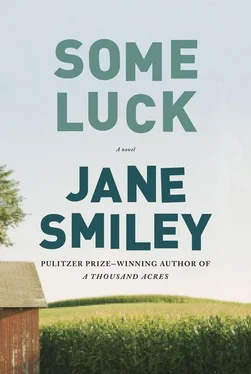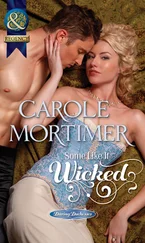The lightning and the thunder seemed incessant now. She glanced around the room. Frankie was right behind her, but Joey was staring from the sofa. She said, “I need to—”
But what did she need to do? It seemed impossible to do anything. The lightning and thunder roared again, this time almost simultaneously, and Rosanna put her elbows on her knees and her face in her hands, just for a moment. Frankie said, right in her ear, “Mama? Is she dead?”
Rosanna sat up. Over the din, she exclaimed, “No, of course not. She’ll be fine!” and just then, Mary Elizabeth’s eyes did open, and then she started to cry. Rosanna slipped her hands under the little girl’s body and gently took her into her arms, then stood up and carried her to the sofa. After that, perhaps she sat there with her daughter moaning in her arms for forty-five minutes — at least that — until the storm subsided and Walter came stomping in from the barn, soaking wet and full of news, already talking—“You should have seen — I thought”—until he was standing in the doorway from the dining room and said, “What happened?”
Frankie said, “May Liz fell down.”
Walter pushed his wet hair out of his face and stepped toward her. “Is she all right?”
No, she wasn’t trying to sit up, though she had said a few words.
“How did she fall down? Was she climbing on something?”
Rosanna said, “I think the back of her head hit the corner of the egg crate.”
“She’ll be fine,” said Walter. “We just need to give her a few hours.”
The vomiting began before suppertime. Walter ran out to start the Ford. He took Frankie and Joey with him, to get them out of Rosanna’s hair. Rosanna wrapped Mary Elizabeth in a blanket and carried her out into the rain, leaning her own body over the baby’s so she wouldn’t get wet. Walter opened the door, and Rosanna slid into the passenger’s seat of the Ford. The boys sat in the back. All the way into town (past Dr. Gerritt’s office and on to Dr. Craddock, who was younger and newer to the area), Rosanna knew it was merely appearance that was moving her forward. Though she was telling the boys that Mary Elizabeth was asleep, so they had to be very quiet, sleep was certainly a thing of the past now.

ROSANNA READ in the paper that Billy Sunday was going to come out from Chicago and do a revival in Mason City — not in a tent, like the old days, but in the theater, and only for two nights. He still came to Iowa fairly often, because that was where he had started out, however many years ago, where he’d played baseball and lived in the orphanage and all, and he still had fond memories of the place and the people.
Father Berger had thought Billy Sunday was the devil, and no one in Rosanna’s family had ever seen him. All the time he was most famous, they acted as if he didn’t exist. But Rosanna got a bee in her bonnet, and it was to take the boys and go up to Mason City and see the famous man.
What was it now, five and a half months since that day, the crashing, thundering day when Mary Elizabeth, such a good child, had passed out of this world for no reason at all? Not a mark on her, and yet she went from talking and running around to lying in Rosanna’s arms to being buried in Walter’s family plot in the space of a weekend, and who was to blame but Rosanna herself? Though no one said that; everybody said the very opposite, in fact — what could she have done, such a freak accident, like that time when … And here was where Rosanna stopped listening. After a month or two, she had garnered massive praise for not succumbing to her grief, but how could you do that on a farm? Never could you say to the corn, you must wait to be harvested; never could you say to the cows, you must put off being milked; never could you say to the boys, don’t get up today; never could you say to the winter weather, I don’t want to build yet another fire.
But she had changed. She hardly ever went into town now — Irma took the eggs and the butter to Dan Crest and got whatever she could for them. She was more particular about cleaning and cooking, and it wasn’t only the winter weather that kept her inside, just as it wasn’t only the farm work that kept Walter out in the barn. If he didn’t want to look at the spot where their child had made that passage from life to death, Rosanna didn’t want to stray far from it. She felt, as soon as she saw the notice in the paper (not thought — she had no thoughts at all, really), that Billy Sunday might give her some new memory, or insight would enter her the way the sunlight entered the windows. Whose fault had it been? Well, obviously hers, but also the fault of the weather, and, beyond that, the heavens. The room had been so dark and so loud.
WALTER DIDN’T MIND Billy Sunday — he’d been to a revival in Cedar Rapids as a boy, a tabernacle affair, a week long (though the Langdons had only stayed three days). Back in those days, Billy still did his patented slide into the middle of the stage (just as he’d slid into home plate those seasons when he was playing in Chicago for Cap Anson). He jumped around and shouted, and Walter had found it entertaining to hear him exhort the members of the audience to “Get on the Water Wagon!” His mother felt that the Sundays may have been a very unfortunate family, and that certainly life was harder in those days during and after the War Between the States, and you had to make your way as best you could, God knew, and Mary Jane Sunday, who had been a Corey, had done the best she could, but, really, they were not the same sort of people as the Chicks and the Cheeks and the Langdons, and so she was immune to his preaching. As Walter remembered, she had sat primly in the tent, glancing around with a small smile on her face. His father had been more susceptible, maybe because of Sunday’s energy and athletic fame, not to mention that his grandfather had been a good farmer over in Story County. After the revival, he had spent a few months reading his Bible in the evenings. But inertia prevailed — they’d gone back to their former religious habits (just enough participation to be able to say they did it, and to keep up friendships with the other members of the church). They didn’t dance (didn’t care for it), but they did play cards (euchre and cribbage), and his father didn’t think that a drop of whiskey from time to time was a damnable thing. That Rosanna wanted to cart the boys all the way to Mason City and then stay in a hotel there (three dollars per night) he thought was strange, but if it got her through this time, he welcomed it, and so did his mother when he mentioned it in town. She said, “She knows what she wants, though maybe she doesn’t know what will work. But if you don’t give her what she wants, she’ll spend the rest of her life thinking that that was the one thing that might have worked.”
Everyone said that Billy Sunday wasn’t the draw he had once been, but as they got closer to the assembly hall, Walter had to be impressed by the crowds streaming around him. He carried Joey in his arms, and he was sorry that he didn’t have a length of rope to tie around Frankie, because Frankie kept disappearing, if only for as long as it took Walter to begin to panic. Rosanna kept saying, “Frankie, hold my hand!” But she was distracted, too. Walter said to her, half joking, “I should have given him his whipping in advance!” but she barely chuckled. A moment later, when Frankie happened to bump into his legs, Walter grabbed his shoulder and said in his strictest voice, “If you don’t stay right with me, they’ll make you stay out, and we’ll go in, and what’ll you do then?”
Читать дальше













